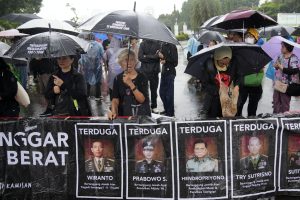Indonesia’s President Joko “Jokowi” Widodo has congratulated his Defence Minister Prabowo Subianto, after unofficial counts showed the gruff former general clinching Wednesday’s presidential election by a decisive margin.
“Congratulations, congratulations. I met them in person, last night,” Jokowi told reporters yesterday, when asked if he had offered his congratulations to Prabowo and his vice-presidential running mate, BenarNews reported.
Official results will not be announced until late March, but unofficial exit polls estimate that Prabowo won around 58 percent of the vote, well over the 50 percent needed to avoid a run-off election in June. This was well ahead of his two rival candidates, Anies Baswedan, a former governor of Jakarta (25 percent), and ex-Central Java governor Ganjar Pranowo (17 percent).
Prabowo’s vice-president will be Jokowi’s eldest son, Gibran Rakabuming Raka, who, at the age of 36, will become the youngest person in Indonesia’s history to hold that office, once he and Prabowo are sworn into office in October. Indeed, Jokowi was widely believed to have implicitly endorsed the pair, overlooking Ganjar, the candidate of his own Indonesian Democratic Party of Struggle.
The election result has prompted the international media to excavate the former general’s long and controversial career. Prabowo first rose to prominence as a military commander under Suharto’s New Order, which governed Indonesia from 1967 to 1998. He served for many years as commander of Kopassus, the army’s special forces, and has been credibly implicated in a litany of human rights abuses, including the abduction and torture of 22 activists who had opposed the New Order, 13 of whom remain missing.
That Prabowo was able to transcend this sordid past, and by such a large margin, offers a striking parallel to the way in which President Ferdinand Marcos Jr., another figure associated with a Cold War-era dictatorship, was able to prevail at the Philippine election of May 2022. Indeed, the resemblances between the two cases are remarkable.
One is the son of a former Cold War-era dictator, the other the ex-son-in-law. Both were disgraced and exiled after the fall of Ferdinand Marcos Sr. in 1986 and the fall of Suharto in 1998, and then managed to return and reinsert themselves into the structures of power. Both enjoyed the blessing of a predecessor – Rodrigo Duterte in the first case, Jokowi in the second – who was hailed as a populist outsider upon his own election (albeit for very different reasons.) Both then deployed an intense social media offensive to rebrand themselves, drown out the echoes of past misdeeds, and achieve a decisive electoral victory.
However, neither case is as surprising as it looks. The two nations’ transitions from authoritarian rule to democracy were in many ways incomplete revolutions, leaving much of the structure of oligarchic power untouched. The shift from corrupt dictatorship to competitive multiparty democracy also concealed continuing economic inequalities, upon which these populist campaigns would later feed. There is also the simple fact of the passage of time, and the fact that many of those who voted for both Marcos and Prabowo have no usable memory of the repression and corruption of the anciens régimes.
But for those old enough to remember, and those who fell afoul of Suharto’s stultifying consensus, Prabowo’s victory has stirred up fearful memories, as the Marcos reconquista did in the Philippines. As Indonesia’s president-elect was celebrating his victory with his sky-blue-clad supporters yesterday, relatives of the 13 activists who disappeared in 1998 gathered in the rain outside the Presidential Palace in Jakarta.
As The Associated Press reported, the people held up pictures of the generals they held responsible for the disappearances of their loved ones, including an image of Prabowo. “Mr. Prabowo, if you are going to be the president, please resolve the enforced disappearance cases so that we, the victims’ families, can have peace,” Paian Siahaan, 77, told the news agency.
Unfortunately, the ghosts of the Suharto era seem set to be drowned out by cheers of triumph and acclamation.

































